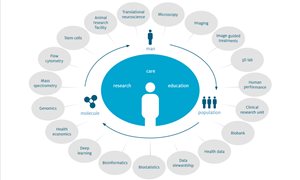

About
We focus on basic and translational research in the medical biosciences, from molecules to humans, to better understand disease and health and improve diagnostics and treatment.
Contact

prof. dr. Jolanda de Vries
department head
Contact our team by email:
contact form
Research groups organized by our department
Scientific impact

Ambition and impact
See how our department creates scientific impact that leads to innovation in health and healthcare.
read moreAmbition and impact
We combine research and teaching in various aspects of medical biosciences from the molecular to the whole body level.
We study the biochemical, cellular and physiological aspects of biological processes in health and disease, using both experimental and informatics approaches, and to use this knowledge to further improve health care.
We work on the development of new drug delivery approaches, biomaterials for tissue engineering, and the immunological treatment of tumors, aiming at the translation of our findings to clinical applications.
-
Dendritic Cell (DC) therapy represents a promising immunotherapeutic approach for the treatment of cancer.
DC therapy harnesses the body’s immune system to fight cancer. Since 1997, we’ve conducted clinical trials using personalized vaccines made from a patient’s own immune cells. These are prepared in cleanrooms and administered as DC vaccines.
Our trials have focused mainly on melanoma, with over 350 patients treated. DC vaccination has shown good tolerance and minimal side effects.
![]()
-
GLOBAL-DATA-MATCH is an international, world-leading collaboration between Radboudumc, University of Glasgow and Liverpool John Moores University, aiming to provide definitive estimates on the effect of exercise-based cardiac rehabilitation in people with cardiovascular disease. More information can be found on the GLOBAL-DATA-MATCH webpage.
-
About 7,000 rare hereditary diseases affect ±8% of the EU population, which translates to ±36 million people. Identification of causative mutations of such diseases thus, forms an essential step towards diagnosis as well as towards development of treatment. This project aims to predict (and eventually explain) functional effects of variants of unknown clinical significance. More information can be found on the Diagnostics-in-3D webpage.

Research programs
Our department is active in several research programs. Use the filter option on the research programs page to see which programs we contribute to.
see page
Technology centers to boost your research
See which of the 19 technology centers are affiliated with our department and how they can enhance your research.
read moreTechnology centers to boost your research
The Radboudumc Technology Centers are an access point for technological expertise, high-end equipment and biobanks. They can support a wealth of research questions. The centers are linked to research facilities of both Radboudumc and Radboud University.
See which of the 19 technology centers are affiliated with our department and how they can enhance your research.
-
This technology center offers computational biology and big data solutions that we believe are key in shaping the data-driven life science and care of the future. It is a one-stop-shop for biodata analysis with rapid deployment without sacrifices on safety and privacy.
For more information and services, see their page.
-
This technology center offers human in-vivo measurement techniques to study human functionality from the level of organs to individuals as a whole. These can play an important role in the evaluation of new therapies and interventions at the patient level.
For more information and services, see their page.
-
This technology center offers access to a wide range of optical and electron microscopy platforms. It provides training and support for users in all aspects of microscopy from experimental setup, image acquisition, analysis and data interpretation.
For more information and services, see their page.
News about our research
Other efforts
Education
We actively engage in education and are driven to deliver the best possible learning experience. We are responsible for teaching a large number of courses at bachelor's and master's level, we provide opportunities for student project work and internships, and we facilitate PhD education.
The main teaching tasks of the department are within the (bio)medical sciences and dentistry at Radboudumc and the natural and life sciences at the Faculty of Science of the Radboud University. The department plays an important role in the international master program Molecular Mechanisms of Disease (MMD). Within the Faculty of Science we participate in the curricula of Molecular Sciences and Biosciences.
In addition, the department is active in the Radboud Honours Programme Medical Sciences and contributes to activities organized by the Research Institute for Medical Innovation.
Internships
Motivated undergraduate students are welcome to participate in internships within our department. We advise you to inquire for a position 6-9 months in advance. For application and additional information visit this website.
Organization and people
Getting here
Visiting address
Geert Grooteplein 28
6525 GA Nijmegen
Directions



Vacancies
When research positions become available in our department, they will automatically appear in an overview below.




